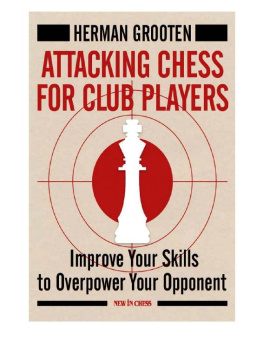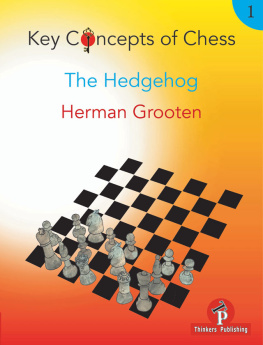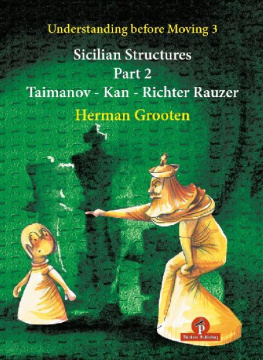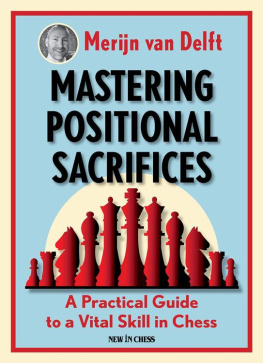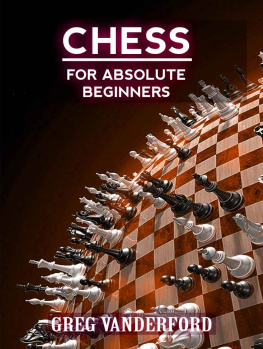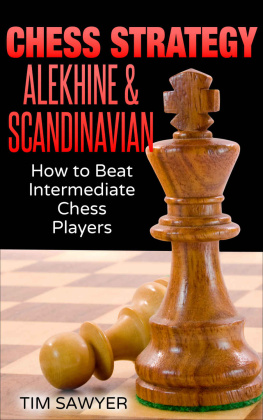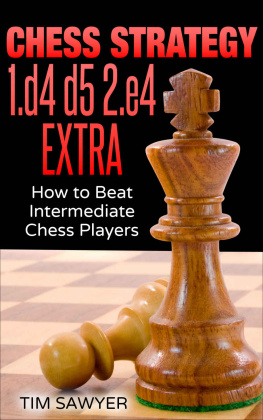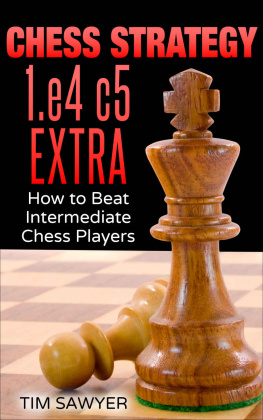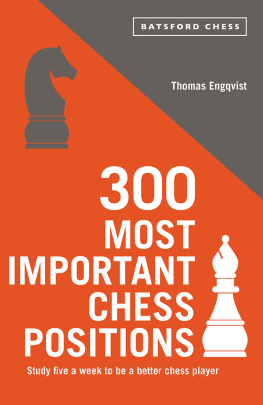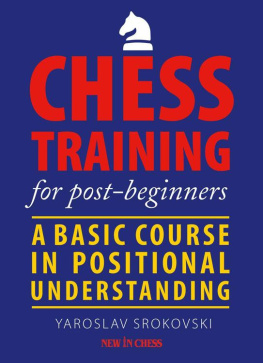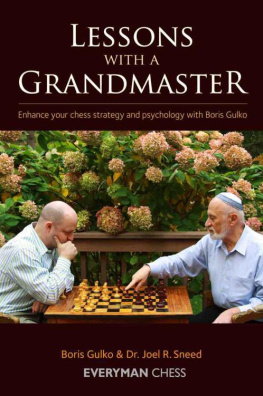About the author
Herman Grooten is an international master who has worked as a chess trainer for more than 30 years. In this capacity, he has trained many young Dutch talents, privately or on behalf of the Dutch chess federation KNSB. For this federation he is also charged with the education of new trainers. Besides this, he gives chess lessons, lectures and clinics at chess clubs on a private basis.
Grooten has also been active in the area of chess journalism. For seventeen years he wrote the weekly chess column for the national Dutch newspaper Trouw, and for eight years he wrote a chess column in the regional newspaper Het Eindhovens Dag-Mad.
Although nowadays less active as a player, Grooten achieved a grandmaster norm in the Leeuwarden Open, 1995.
Bibliography
Literature:
| Bronstein | The Sorcerers Apprentice |
| Bronstein | Zurich International Chess Tournament 1953 |
| Dvoretsky | Secrets of Chess Tactics |
| Euwe | Fischer en zijn voorgangers |
| Euwe | Oordeel en plan |
| Hochberg (ed.) | How to Open a Chess Game |
| Golenichev | Test en train uzelf |
| Grooten | De verdediging van de koning |
| Karpov & Mazukevi | Stellungsbeurteilung und Plan |
| Kasparov | My Great Predecessors Part I-V |
| Kasparov | My Games |
| Kasparov & Schiller | Fighting Chess |
| Keres | Ausgewhlte Partien |
| Kotov | Think like a Grandmaster |
| Kotov | Play like a Grandmaster |
| Matanovic a.o. | Chess Informant |
| Nimzowitsch | Mein System |
| Samarian | Das systematische Schachtraining |
| Stean | Simple Chess |
| Suba | Dynamic Chess Strategy |
| Suetin | Three steps to Chess Mastery |
| Timman | Het groot analyseboek |
| Tisdall | Improve Your Chess Now |
| Uhlmann & Schmidt | Offene Linien |
| Vukovic | Der Rochade-Angriff |
| Van Wijgerden/Brunia | De stappenmethode |
Periodicals and magazines:
Jeugdschaak
Schaakbulletin
Schakend Nederland
Toernooimagazine halve finales NK
Websites:
www.schaakbond.nl
www.chessbase.com
www.chessvibes.com
www.newinchess.com
Chapter 1
Steinitzs Elements
1.1 Introduction
In present-day chess, every self-respecting player uses a computer with the most popular chess programs. Besides the known databases, in which millions of games can be found, most chess fans use strong engines to scrutinize their own games.
Ever since Kasparov lost his match with Deep Blue and Kramnik went down in a match with Deep Fritz, it looks as if humankind has definitely lost the battle with the machine. According to the Dutch grandmaster and columnist Hans Ree, this is a blessing for chess. We human beings are finally on our own again, he once quipped with great satisfaction.
This book is all about the question with which every club player and tournament shark is struggling: the opening is over how to continue the game?
As long as we dont play against computers, we can permit ourselves to make (tactical) mistakes. At club level, but also in the international tournament arena, nobody is capable of turning out a perfect game. And this is just as well, since thats what makes our game so exciting and fascinating. Precisely at such moments, when the mistakes crop up, the game is all about outwitting your opponent.
How do games develop in general? After the opening a struggle unfolds where the main purpose is to play your pieces to good squares. But which squares are good? And how do we determine this?
Several times in the game of course, depending on the type of position we find ourselves in concrete calculation is needed, and we have to take stock of the tactical motifs. But in a substantial part of the game there is nothing concrete to calculate, and we have to try to improve our position. Precisely for those cases, we must accumulate a certain amount of understanding of how to go about this. In this book we offer a guideline for making well-considered choices in this area.
Of course, we should not forget that strategy and tactics are inextricably bound up with each other. I myself am known as a strategist, but to my detriment I have to confess that I spoil many a beautiful position by tactical mistakes. At such moments the fate of a chess player is cruel. In a game you have made 39 great moves, and then you produce one disgustingly bad one in such cases you curse yourself for ever having given in to this addiction
Fortunately, many chess players have a selective memory they mainly remember their great achievements and banish their horrible blunders from their memory
1.2 Opening theory
The importance of opening theory is grossly overestimated. Obviously, the knowledge of opening moves comes in handy when setting up a chess game, but this knowledge alone does not bring universal happiness. After this you still have to play chess, and for that other things will require attention.
Six-time Dutch champion GM Loek van Wely gave his opinion on this subject in an interview with the Dutch chess pro-motor Karel van Delft in 1996: With many Dutch youth players, opening knowledge is heavily over-developed. It is better for them to gain more understanding in the middle- and endgame by studying chess books. This irritates me now and then. They know all kinds of opening variations. Its as if they are reciting a lesson. And as soon as its time to play real chess, they often understand nothing from this opening. Take the Sveshnikov Sicilian. Even with my rating, I hardly understand it. It would be better for them to study the Dragon or the Kings Indian. They can learn something there. I only started to study openings seriously when I had a 2400 rating.
The entire interview can be read in the interesting book with the title Schaaktalent ontwikkelen (Developing chess talent), published by Karel van Delft and his son, IM Merijn van Delft, in 2008. An English translation of this book is planned for 2010.
Also the famous Russian chess trainer Mark Dvoretsky expressed similar sentiments about this craving for opening knowledge. In the book The Chess Instructor 2009 (New In Chess), he writes: A chessplayer should not become a slave of his opening knowledge. He analyses a game between the Dutch players Ted Barendse and the then 18-year-old Merijn van Delft (now a good IM). In his observations on this game Dvoretsky points at the following: the opening moves were made at the level of the leading grandmasters in the world. But as soon as knowledge came to an end, there promptly followed some ridiculous mistakes. So how should a young player proceed further: continue to perfect his opening repertoire, or nevertheless switch to other problems?
If even such a successful coach addresses us like this, who are we to turn a deaf ear to such advice?
Yet, many (youth) players cannot be convinced of this. And this is understandable. With the current computers and advanced tools you can spend quite a lot of time on openings. The subject matter is concrete, and you will quickly get the feeling that you are doing useful work. But, as said, its use is quite relative. Still, what is the alternative? What should you do to get better? As there is no ready-made answer to this question, most players continue on the chosen path.
This book aims to take another course. Our intention is to enhance the understanding of the reader. Questions like How do I devise a plan? or What are the characteristic features of this position? actually play the most important role here.


